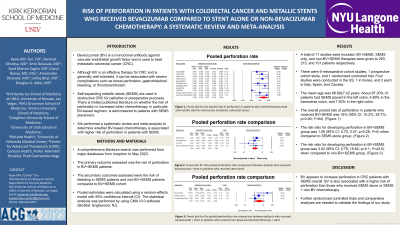Sunday Poster Session
Category: Colon
P0196 - Risk of Perforation in Patients With Colorectal Cancer and Metallic Stents Who Received Bevacizumab Compared to Stent Alone or Non-Bevacizumab Chemotherapy: A Systematic Review and Meta-Analysis
Sunday, October 22, 2023
3:30 PM - 7:00 PM PT
Location: Exhibit Hall

Has Audio

Kyaw Min Tun, DO
Kirk Kerkorian School of Medicine at UNLV
Las Vegas, NV
Presenting Author(s)
Kyaw Min Tun, DO1, Banreet S. Dhindsa, MD2, Smit Deliwala, MD3, Syed Mohsin Saghir, MD4, Daryl Ramai, MD, MSc5, Amaninder Dhaliwal, MD6, Ishfaq Bhat, MD2, Douglas G. Adler, MD7
1Kirk Kerkorian School of Medicine at UNLV, Las Vegas, NV; 2University of Nebraska Medical Center, Omaha, NE; 3Emory University School of Medicine, Atlanta, GA; 4Creighton University, Omaha, NE; 5University of Utah, Salt Lake City, UT; 6McLeod Health, Florence, SC; 7Center for Advanced Therapeutic (CATE), Centura Health, Porter Adventist Hospital, Peak Gastroenterology, Denver, CO
Introduction: Bevacizumab (BV) is a monoclonal antibody against vascular endothelial growth factor and is used to treat metastatic colorectal cancer (CRC). Although BV is an effective therapy for CRC and is generally well-tolerated, it can be associated with severe complications such as bowel perforation, gastrointestinal bleeding, or thromboembolism. Self-expanding metallic stents (SEMS) are used in obstructive CRC for palliative or preoperative purposes. There is a paucity of published literature on whether the risk of perforation is increased when chemotherapy - BV-based regimen in particular - is administered to patients with SEMS placement. We performed a systematic review and meta-analysis to determine whether BV-based chemotherapy is associated with higher risk of perforation in patients with SEMS.
Methods: A comprehensive literature search was performed from major databases from inception to May 2023. The primary outcome assessed was the risk of perforation in BV+SEMS patients. The secondary outcomes assessed were the risk of bleeding in SEMS patients and non-BV+SEMS patients compared to BV+SEMS cohort. Pooled estimates were calculated using a random-effects model with 95% confidence interval (CI). The statistical analysis was performed by using CMA v 3.0 software (BioStat, Englewood, NJ).
Results: There were 11 studies included, with BV+SEMS, SEMS only, and non-BV+SEMS therapies given in 293, 215, and 101 patients respectively. There were 9 retrospective cohort studies, 1 prospective cohort study, and 1 randomized controlled trial. Four studies were conducted in the US, 1 in Korean, and 2 each in Italy, Spain, and Canada. The mean age was 66.69±7.42 years. About 87.20% of patients had SEMS placed in the left colon, 4.89% in the transverse colon, and 7.93% in the right colon. The overall pooled rate of perforation in patients who received BV+SEMS was 18% (95% CI: 10.2%, 29.7%; p=0.00; I2=64) (Figure 1). The risk ratios for developing perforation in BV+SEMS group was 1.56 (95% CI: 0.70, 3.47; p=0.28; I2=0) when compared to SEMS alone group and was 3.52 (95% CI: 0.79, 15.62; p=0.1; I2=42.5) when compared to non-BV+SEMS group.
Discussion: BV appears to increase perforation in CRC patients with SEMS, and is associated with a higher risk of perforation than those who received SEMS alone or SEMS + non-BV chemotherapy. Further randomized controlled trials and comparative analyses are needed to validate the findings of our study.

Disclosures:
Kyaw Min Tun, DO1, Banreet S. Dhindsa, MD2, Smit Deliwala, MD3, Syed Mohsin Saghir, MD4, Daryl Ramai, MD, MSc5, Amaninder Dhaliwal, MD6, Ishfaq Bhat, MD2, Douglas G. Adler, MD7. P0196 - Risk of Perforation in Patients With Colorectal Cancer and Metallic Stents Who Received Bevacizumab Compared to Stent Alone or Non-Bevacizumab Chemotherapy: A Systematic Review and Meta-Analysis, ACG 2023 Annual Scientific Meeting Abstracts. Vancouver, BC, Canada: American College of Gastroenterology.
1Kirk Kerkorian School of Medicine at UNLV, Las Vegas, NV; 2University of Nebraska Medical Center, Omaha, NE; 3Emory University School of Medicine, Atlanta, GA; 4Creighton University, Omaha, NE; 5University of Utah, Salt Lake City, UT; 6McLeod Health, Florence, SC; 7Center for Advanced Therapeutic (CATE), Centura Health, Porter Adventist Hospital, Peak Gastroenterology, Denver, CO
Introduction: Bevacizumab (BV) is a monoclonal antibody against vascular endothelial growth factor and is used to treat metastatic colorectal cancer (CRC). Although BV is an effective therapy for CRC and is generally well-tolerated, it can be associated with severe complications such as bowel perforation, gastrointestinal bleeding, or thromboembolism. Self-expanding metallic stents (SEMS) are used in obstructive CRC for palliative or preoperative purposes. There is a paucity of published literature on whether the risk of perforation is increased when chemotherapy - BV-based regimen in particular - is administered to patients with SEMS placement. We performed a systematic review and meta-analysis to determine whether BV-based chemotherapy is associated with higher risk of perforation in patients with SEMS.
Methods: A comprehensive literature search was performed from major databases from inception to May 2023. The primary outcome assessed was the risk of perforation in BV+SEMS patients. The secondary outcomes assessed were the risk of bleeding in SEMS patients and non-BV+SEMS patients compared to BV+SEMS cohort. Pooled estimates were calculated using a random-effects model with 95% confidence interval (CI). The statistical analysis was performed by using CMA v 3.0 software (BioStat, Englewood, NJ).
Results: There were 11 studies included, with BV+SEMS, SEMS only, and non-BV+SEMS therapies given in 293, 215, and 101 patients respectively. There were 9 retrospective cohort studies, 1 prospective cohort study, and 1 randomized controlled trial. Four studies were conducted in the US, 1 in Korean, and 2 each in Italy, Spain, and Canada. The mean age was 66.69±7.42 years. About 87.20% of patients had SEMS placed in the left colon, 4.89% in the transverse colon, and 7.93% in the right colon. The overall pooled rate of perforation in patients who received BV+SEMS was 18% (95% CI: 10.2%, 29.7%; p=0.00; I2=64) (Figure 1). The risk ratios for developing perforation in BV+SEMS group was 1.56 (95% CI: 0.70, 3.47; p=0.28; I2=0) when compared to SEMS alone group and was 3.52 (95% CI: 0.79, 15.62; p=0.1; I2=42.5) when compared to non-BV+SEMS group.
Discussion: BV appears to increase perforation in CRC patients with SEMS, and is associated with a higher risk of perforation than those who received SEMS alone or SEMS + non-BV chemotherapy. Further randomized controlled trials and comparative analyses are needed to validate the findings of our study.

Figure: Figure 1: Forest plot for the pooled rate of perforation in patients who received bevacizumab and metallic stent for obstructive metastatic colorectal cancer
Disclosures:
Kyaw Min Tun indicated no relevant financial relationships.
Banreet Dhindsa indicated no relevant financial relationships.
Smit Deliwala indicated no relevant financial relationships.
Syed Mohsin Saghir indicated no relevant financial relationships.
Daryl Ramai indicated no relevant financial relationships.
Amaninder Dhaliwal indicated no relevant financial relationships.
Ishfaq Bhat indicated no relevant financial relationships.
Douglas Adler indicated no relevant financial relationships.
Kyaw Min Tun, DO1, Banreet S. Dhindsa, MD2, Smit Deliwala, MD3, Syed Mohsin Saghir, MD4, Daryl Ramai, MD, MSc5, Amaninder Dhaliwal, MD6, Ishfaq Bhat, MD2, Douglas G. Adler, MD7. P0196 - Risk of Perforation in Patients With Colorectal Cancer and Metallic Stents Who Received Bevacizumab Compared to Stent Alone or Non-Bevacizumab Chemotherapy: A Systematic Review and Meta-Analysis, ACG 2023 Annual Scientific Meeting Abstracts. Vancouver, BC, Canada: American College of Gastroenterology.
